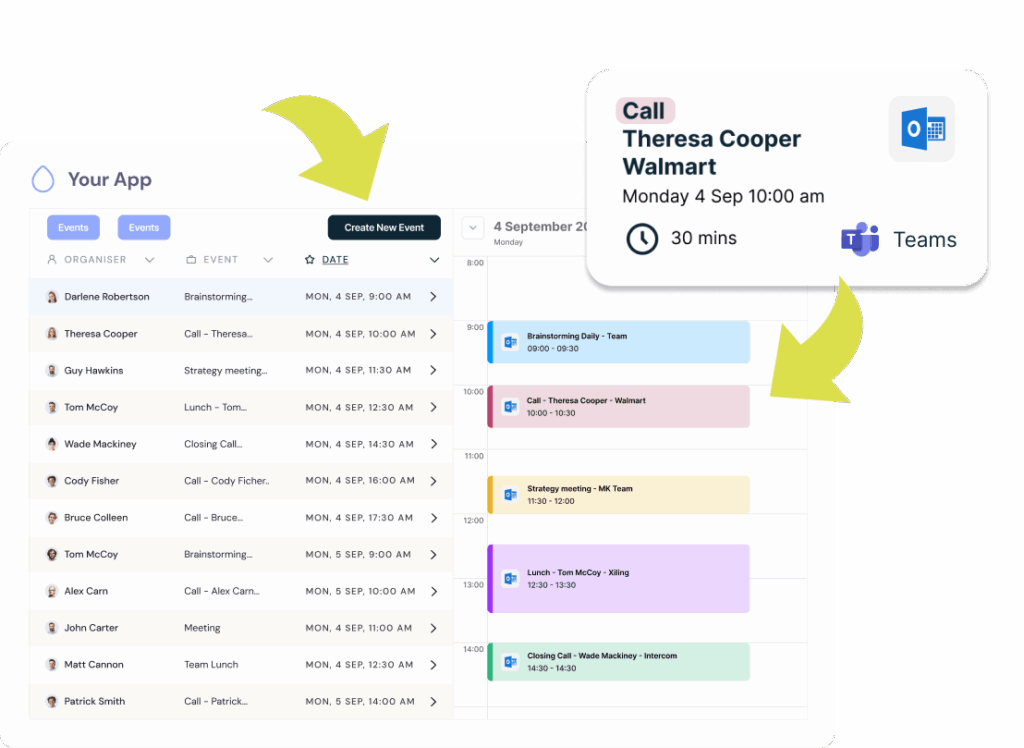For developers building modern productivity tools, the ability to integrate calendars is no longer optional—it’s essential. Whether you’re automating scheduling, syncing events, or triggering reminders, Outlook Calendar stands out as a robust solution thanks to its versatility and enterprise-grade security. Microsoft’s API, combined with the right integration layer, can unlock a frictionless calendar experience across applications.
Integrating calendar features into your app opens new possibilities for user engagement and workflow automation. With Microsoft Graph’s Calendar API, developers can create, manage, and sync calendar events directly within their apps. More technical details are available at: https://www.unipile.com/guide-to-using-microsoft-outlook-calendar-api/
This API enables structured calendar access across primary and shared accounts. It supports granular features such as attendee management, time zone handling, and real-time synchronization. By embedding these capabilities, software publishers enhance not just user experience but also operational efficiency.
Core Features Developers Can Leverage
The Outlook Calendar API offers a rich ecosystem of functionalities that empower developers to craft highly personalized and scalable scheduling experiences. Whether you’re building a simple appointment booking tool or a full-scale productivity suite, these core capabilities lay the groundwork for efficient time management within your application.
Event Lifecycle Management
At the heart of the API is the ability to create, read, update, and delete (CRUD) calendar events through RESTful calls. Developers can dynamically inject events into a user’s calendar, modify them in response to workflow changes, or remove outdated entries—all without manual intervention. This programmatic control enables custom interfaces such as drag-and-drop planners, team coordination dashboards, or AI-based schedulers to function reliably and responsively.
Each event can be enriched with metadata like attendees, descriptions, reminders, locations, and categories. Advanced support for scheduling logic—like detecting conflicts or querying user availability—can be layered on top to power features such as “smart booking” or automated rescheduling.
Recurring Events Made Easy
Recurring meetings and routines are foundational in both personal and corporate calendars. The API simplifies this by offering robust recurrence rule management using RFC 5545 (iCalendar) syntax. You can define daily, weekly, monthly, or custom repetition patterns with precision—whether it’s for a quarterly performance review or a bi-weekly sprint planning session.
The API also allows you to apply exceptions to recurring series—useful for skipping public holidays or modifying a single occurrence without breaking the entire chain. This ensures maximum flexibility while maintaining structural consistency.
Real-Time Synchronization
In modern collaborative environments, stale data can lead to missed meetings and duplicated efforts. The Outlook Calendar API mitigates this through real-time sync capabilities, where changes made to events (via app or user interface) are immediately reflected across devices and integrations.
This is especially critical for distributed teams who rely on up-to-date information across mobile apps, desktops, and web portals. Combined with webhook support (coming soon), developers can implement event-driven architectures that react instantly to changes—triggering follow-ups, notifications, or automations in real time.
Time Zone Intelligence
Managing events across multiple time zones is notoriously error-prone. The API handles automatic timezone detection and conversion, ensuring that event timestamps are normalized according to each participant’s location.
Developers can work with native time zone identifiers like “Pacific Standard Time” or “Europe/Berlin”, and the system will translate event times accurately. This removes the need to maintain separate logic or libraries for timezone handling and allows global teams to stay synchronized effortlessly.
Extended Functionality
Beyond these core pillars, the Outlook Calendar API also supports advanced features such as:
- Attendee status tracking (accepted, tentative, declined)
- Location services integration for hybrid/remote meetings
- Multi-calendar support (e.g., shared calendars or group calendars)
- Color-coded categorization for visual management
- Rich text support in event descriptions
Combined, these features allow developers to deliver calendar experiences that are not only functional but also deeply integrated into the user’s productivity ecosystem. From simple reminder apps to enterprise-grade scheduling tools, the Outlook Calendar API serves as a robust backbone for temporal intelligence.
Why Software Editors Choose Unipile for Calendar API Integration
While Microsoft offers robust documentation, the integration journey can still be complex. Unipile simplifies this process by wrapping the Outlook Calendar API into a unified and developer-friendly environment.
- Hosted Authentication Flow
Instead of implementing a full OAuth 2.0 setup, developers can redirect users to Unipile’s hosted auth page, drastically reducing implementation time. - Automatic Microsoft Account Detection
Unipile automatically detects whether the user has a Microsoft account, streamlining authentication and ensuring a frictionless onboarding experience. - Secure Credential Retrieval
After user consent, access credentials are delivered securely, allowing apps to manage events, send invites, or edit calendar data instantly. - Unified Calendar Support
In addition to Outlook, Unipile supports Google Calendar. Developers can manage both platforms through one API, enabling broader compatibility and easier maintenance.
Developer Advantages Beyond Integration
Unipile isn’t just a technical shortcut—it’s a long-term partner for API success:
- Live Technical Support: Get direct access to expert developers before, during, and after deployment.
- Proactive Maintenance: Regular API updates and compliance checks ensure reliability and security.
- Scalable Architecture: Whether you’re serving 100 or 1 million users, Unipile scales with your app’s growth.
- Unified Dashboard: Monitor and manage all user calendar connections from a central place.
Conclusion
Integrating Microsoft’s Outlook Calendar API unlocks powerful scheduling capabilities—but using a unified platform like Unipile accelerates time to market, reduces development workload, and provides a robust, future-proof integration. Whether you’re building for sales, HR, or team collaboration, streamlined calendar access has never been more critical—or more achievable.

